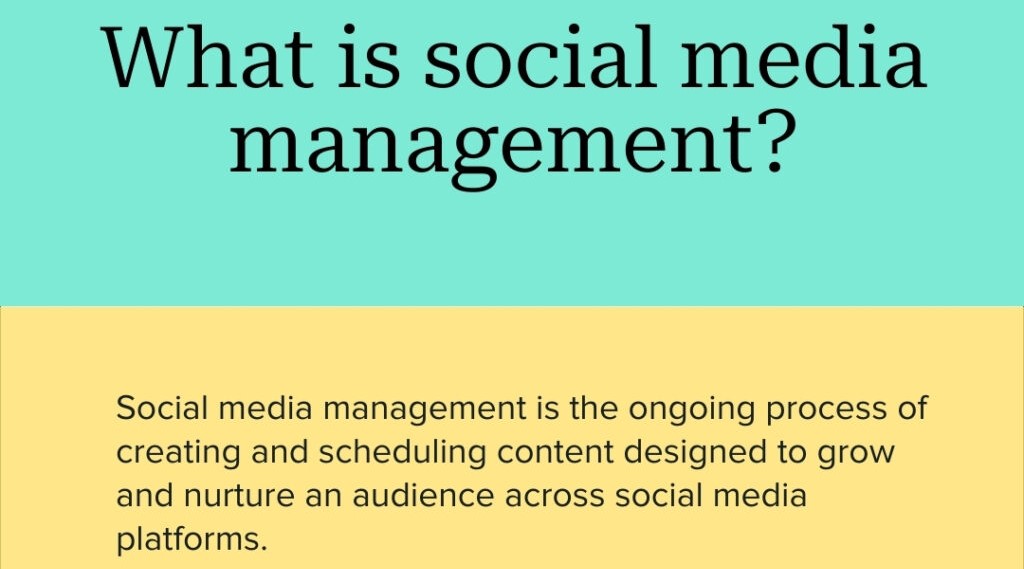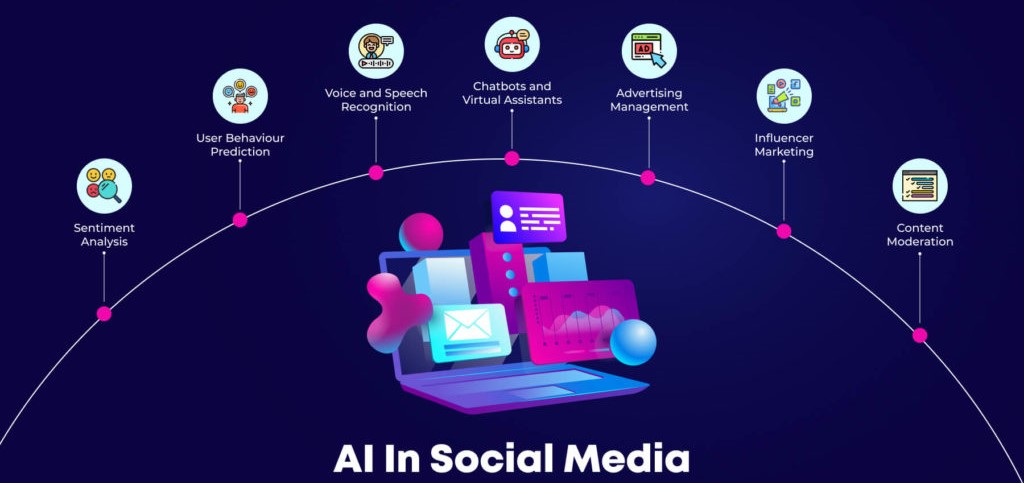A strong social media presence promotes brand awareness, supports customer care and expands reach to new audiences. Effective partnerships with influencers can impact lasting audience connections. Besides, properly times creative visuals and copy can alter customers’ perceptions of an organization. However, you can only achieve those benefits with effective social media management.
Contrary to what some may think, social media management is not just a task but, the make or break factor for brands. The following article breaks down the nitty gritty, diving into what the management of social media rellay entails, how to streamline and make it work for your brand to drive tangible results.
What is Social Media Management?
Social media management refers to the process of strategically overseeing and optimizing the presence of a brand across various social media channels. It entails the entire process from creating and scheduling content to engaging with audiences and analyzing performance. The management of social media is about having a strategy that drives real business impact by strengthening brand awareness, cultivating relationships and enhancing consistency across platforms.
The stakes for social media management are much higher in 2025. With more than 5.24 billion social media users globally and rapidly evolving platforms, brands without a structured approach risk being left behind. Most of the customers today say they are more likely to buy from a brand they feel connected to on social media. That means a well-managed social media presence is imperative to every business in this age.
The effective management of social media includes but, is not limited to the following;
- Social media content strategy
- Community management and programming
- Online reputation management
- Paid social media strategy and execution
- Team member management and development

The Role of a Social Media Manager
A social media manager is responsible for developing strategies that maintain and grow social presence. It can also extend to administrative and team development tasks. On a typical day, social media managers might engage in content creation, campaign strategies, career planning and reporting.
However, the job of a social media manager does not end there. Besides managing social media accounts, they must also prove social media ROI. That involves tracking social media engagement, conversions and brand sentiment to show decision-makers how social promotes business growth. That also means translating likes, comments and shares into tangible value such as lead generation, increased sales or enhanced customer loyalty.
Managing social media successfully requires a unique set of skills that include but, not limited to the following;
- Adaptability
- Creativity
- Organization
- Critical thinking
- Curiosity
A combination of these skills can help professionals to manage the evolving needs of social media management.
Why Social Media Management is Crucial for Businesses
Having accounts on social media is not enough; the way you manage them is what can make or break your brand. An inconsistent, scattered approach results in missed opportunities. Alternatively, a well-managed strategy can drive real business impact. Here is why social media management is imperative for businesses.
Consistency builds credibility
Social media is a fast-moving frontier that requires consistent efforts to deliver results. If you are not managing posts, responses and campaigns in a structured way, you risk fading into oblivion and irrelevance. Managing social media effectively keeps your brand ahead of the rest without scrambling at the last minute.
Looking for solutions to boost your social media presence and engagements organically? Superior Social Boost offers customized packages to help businesses drive engagement on Facebook, TikTok, Instagram, X, YouTube and Google Business.
Conversations should be controlled
Customers usually expect instant responses and every comment, tag and mention is a great opportunity or a ticking time bomb. Proper social media management requires you to actively monitor conversations, address concerns before they escalate, and ensuring a consistent brand voice across all your channels.
Efficiency will save you time
Managing multiple social media accounts manually is time consuming. Smart management of social media, mainly through automation, scheduling and streamlining workflows reduces effort and helps you to maximize results. It allows you and your team an ample time to focus on strategy.
Data integration leads to smarter decisions
Every social media post, like, comment, share and click tells a story. It is easy for valuable social media insights to get lost in the noise without proper management. A structured approach helps businesses with tracking performance, refining strategies and allocating budgets effectively.
While having a consistent social media presence is crucial, performance is what counts. Remember social media management should be driving both reactions and revenue.
The Best Ways to Manage Social Media
Social media management is a system of interconnected actions that drive results. The following are best practices for managing social media effectively.
Diversify your networks
Managing social media accounts an art and science. Data can give you a good idea of how to effectively spend your resources including money and time. However, things usually move very fast on social media. The channel delivering results today might take a dip the next day.
Diversifying your platform strategy is a reliable step in making sure that you are ready for the challenges that come your way. An algorithm update on a particular network will not be much of a shock to the system if you maintain a proper presence on the social media world.
Social media management tools make it more efficient to manage multiple workflows because you do not have to do a lot of the work manually.
Listen to what the market is saying
Knowing your audience is essential to creating impactful content. Narrowing down on those individuals enables you to craft more effective messaging across your social media platforms. That is why it is very important that you listen to the market. Social listening extends beyond tracking brand mentions to actively analyzing audience conversations, competitor strategies and industry trends.
Social listening tools enable you to discover customer pain points, shifting preferences and emerging opportunities quickly and effectively. That enables you to refine your messaging, enhance product positioning and identify gaps competitors may be missing out.
Automate and leverage AI
The 2025 Sprout Social Index reveals 97% of marketing leaders say it is crucial their teams know how to use AI in their daily work. Automation and AI will enable you to effectively transform your social management. You can automate routine tasks and reporting, streamline workflows and improve decision-making.

AI tools can also help you to schedule posts at the best times for maximum engagement, analyze audience sentiment to manage brand image better and generate content ideas based on trends. It can also help you become a more efficient team by managing huge volumes of customer interactions with chatbots. Besides, you can also personalize messaging while maintaining authentic communication.
Automation and AI can also provide in-depth social media analytics for definitive insights into social performance to refine strategies better. The automated analytics and reporting also save you a lot of time, which can be re-focused on creativity, strategy and meaningful audience connections.
New Trends in Social Media Management
In 2025, social media is in top gear, growing exponentially. Brands that stay ahead are not just keeping up with trends but, setting them. Here are the key trends in social media management that you need to keep an eye on.
AI Integration
AI now handles quite a number of repetitive tasks including scheduling, sentiment analysis and even drafting responses. However, augmentation is the winning strategy; the use of AI as your creative intern that can be trained and refined to deliver the desired results.
Tools such as ChatGPT-5o can handle predictive engagement by suggesting replies based on past interactions. But, you should always add a human touch to the posts and replies before publishing. You must fact-check, refine and add personality to make AI work for you, not instead of you. AI should serve as your co-pilot and not your replacement!
Private and secure social media management
With the growing concerns about data privacy, brands cannot afford to mismanage social media. You can expect more stringent compliance measures, role-based access and audit trails to track all the actions for accountability.
Use social media governance tools to control who can post, respond and access your social data to prevent unauthorized actions that could derail your strategy. Implement automated approval workflows to boost compliance with brand guidelines and legal policies.
Centralized command centers
Managing social media accounts across multiple channels can be chaotic if it is not centralized. More businesses are adopting all-in-one social media management suites to harmonize scheduling, listening and analytics in real-time.
Use unified platforms to manage everything from a single place. That will effectively reduce app-switching inefficiencies. Create cross-channel workflows to ensure the seamless flow of engagement, approvals and crisis alerts across your teams.
Social Media Management FAQs
- What are the first steps to managing social media for my business?
Begin by auditing your existing accounts, choosing 1-2 key social platforms where your audience is active and, planning consistent, goal-oriented content. Tools such as content calendars and scheduling apps maintain consistency.
- How can social media management benefit my business?
Social media management is important for companies because a strong online presence contributes to quality community engagement, enhanced brand reputation and more effective customer care. A successful strategy for managing social media fosters brand awareness and loyalty.
- How much time should I spare for social media management each day?
The amount of time can vary widely depending on the size of your business and the number of channels that you manage. On average, businesses may spend anywhere from 1 to 3 hours each day on tasks such as content creation, posting, engagement and analytics review.
- What are the common mistakes to avoid in social media management?
The most common pitfalls that you should avoid in social media management include:
- Ignoring engagement – Respond to build trust with followers and customers
- Lack of strategy – posting content randomly can lead to low ROI
- Focusing on vanity metrics – Conversions matter more
- Not optimizing for platforms – Tailor content to every platform and audience
- Over-automating – Maintain a human touch
- How do I measure success in social media management?
Track engagement rates for social media likes, shares, comments, follower growth, web traffic, conversion rates and overall brand sentiment. The best tools for managing social media can provide real-time insights for data driven decisions.

- What are the business functions of social media management?
The primary business functions of social media management are marketing and customer service. Publishing relevant content and communicating directly with customers can enable you to identify opportunities to improve your product and service offerings. Effective management of social media can also boost sales and targeted efforts such as influencer marketing where a strategic approach is crucial for success.
The Bottom Line
Social media offers businesses the insights and intelligence needed to understand where they fit in the cultural landscape. A strong strategy for social media management goes beyond just maintaining an online presence. It can help your brand to gain relevance and future-proof itself for many years to come.

